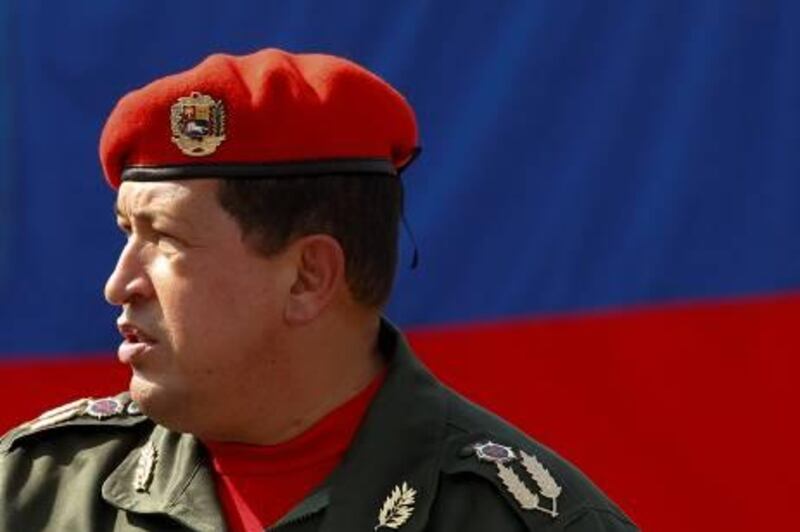CARACAS // Venezuela President Hugo Chavez's government sold China oil for as little as US$5 a barrel and was upset that China apparently profited by selling fuel to other countries, according to a classified US document released by WikiLeaks.
The report about Chinese companies diverting oil was one of several newly released documents that also describe falling crude output in Venezuela caused by a host of problems within the national oil company, Petroleos de Venezuela SA, or PDVSA.
The documents, posted online by the Spanish newspaper El Pais, also showed that American officials had managed to cultivate sources within the state oil company in spite of Mr Chavez's antagonism toward Washington.
The confidential memo from the US Embassy in Caracas on February 26 said a PDVSA director revealed that the state company "had analysed its crude sales to China and determined that China had only paid $5/barrel of crude on a couple of deals" - a small fraction of the market price.
The document said that according to the official, Mr Chavez's government was "extremely upset with Chinese companies due to the discrepancy between Chinese petroleum import statistics that suggest [China] is profiting from Venezuelan oil purchases by diverting the crude to third markets and earning a sizeable margin".
The Venezuelan official, whose name was not released, "intimated that tankers had been diverted to the US, Africa, and elsewhere in Asia".
Neither the Venezuelan government nor PDVSA reacted to the report. Calls to the Chinese Embassy in Caracas went unanswered on Tuesday. In China, there were no immediate responses to requests for comment from Sinopec, China's largest oil refiner; the China National Petroleum Corp; the Foreign Ministry and the National Development and Reform Commission, the country's top economic planning body.
Mr Chavez relies on oil sales to his top client, the United States, to help fund his socialist-inspired programmes. But he has been building up oil sales to China, and in October he said that oil shipments to China had reached about 500,000 barrels a day, in spite of higher transport costs to reach Asia.
Jorge Pinon, an energy expert and visiting research fellow at Florida International University in Miami, said he doubted that Venezuela's heavy crude would have been resold by China elsewhere because specialised refineries were needed to handle it. He said if there were any reselling by China, it would have been fuel oil and could have gone to Africa, Asia or the Caribbean "for blending and further re-export" to other markets.
China, meanwhile, has also agreed to invest billions of dollars in a joint project to pump crude in Venezuela.
Another embassy report on September 23, 2009, said a US diplomat had interviewed "PDVSA's senior executive director" when he was spotted in line at the embassy waiting for a US visa, and that the official revealed Venezuela had been manipulating its oil price index.
It said the official confirmed that Venezuela "manipulates its Venezuelan Crude Oil basket index by including refined products in the mix". That method of calculating oil prices, which the official said "accurately reflected revenue from all of PDVSA's sales of crude petroleum and refined products", was responsible for narrowing the gap between prices for Venezuela's heavy sulphur-laden crude and benchmark light, sweet crude.






